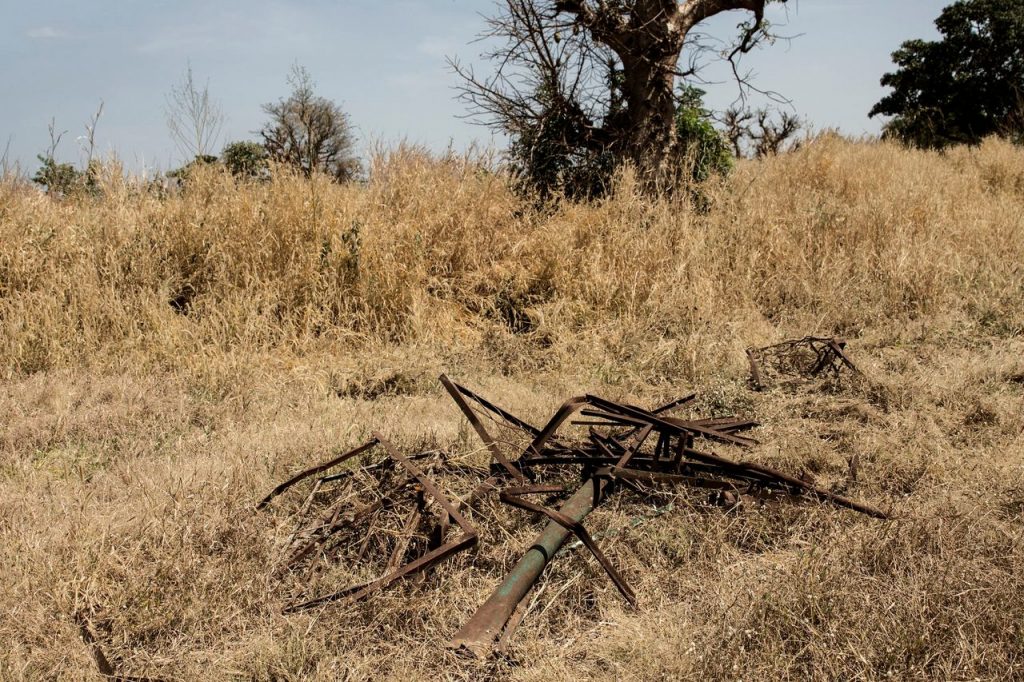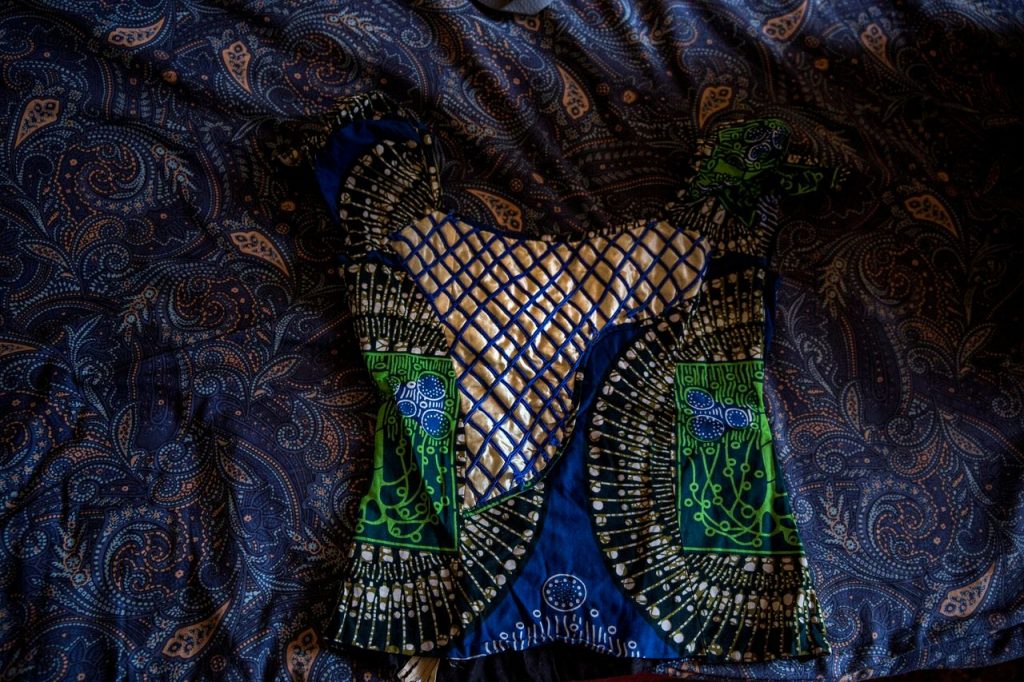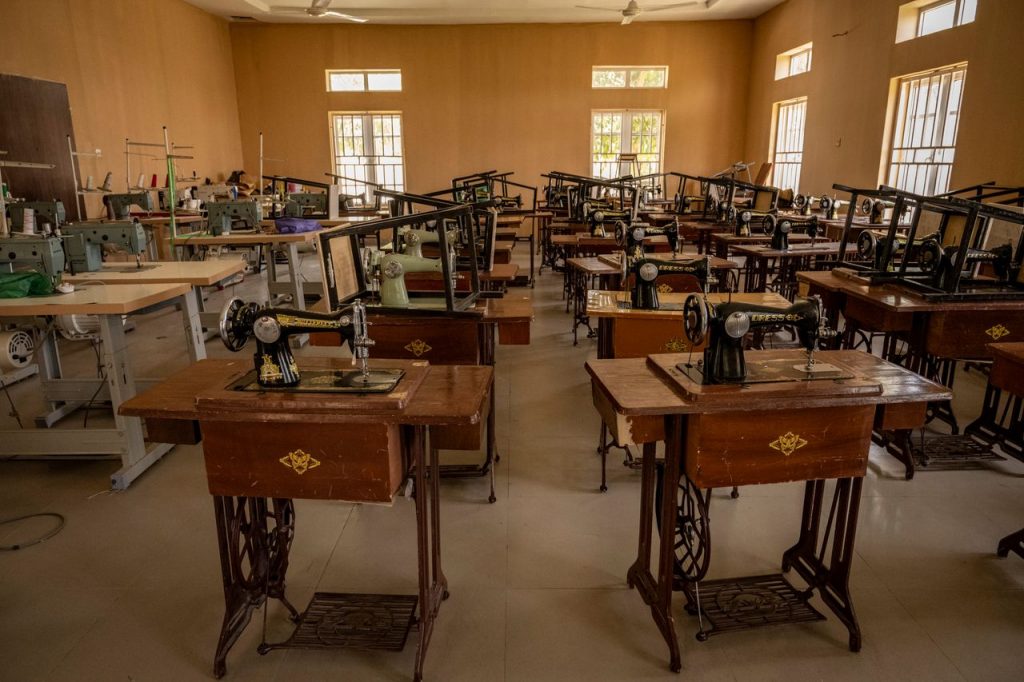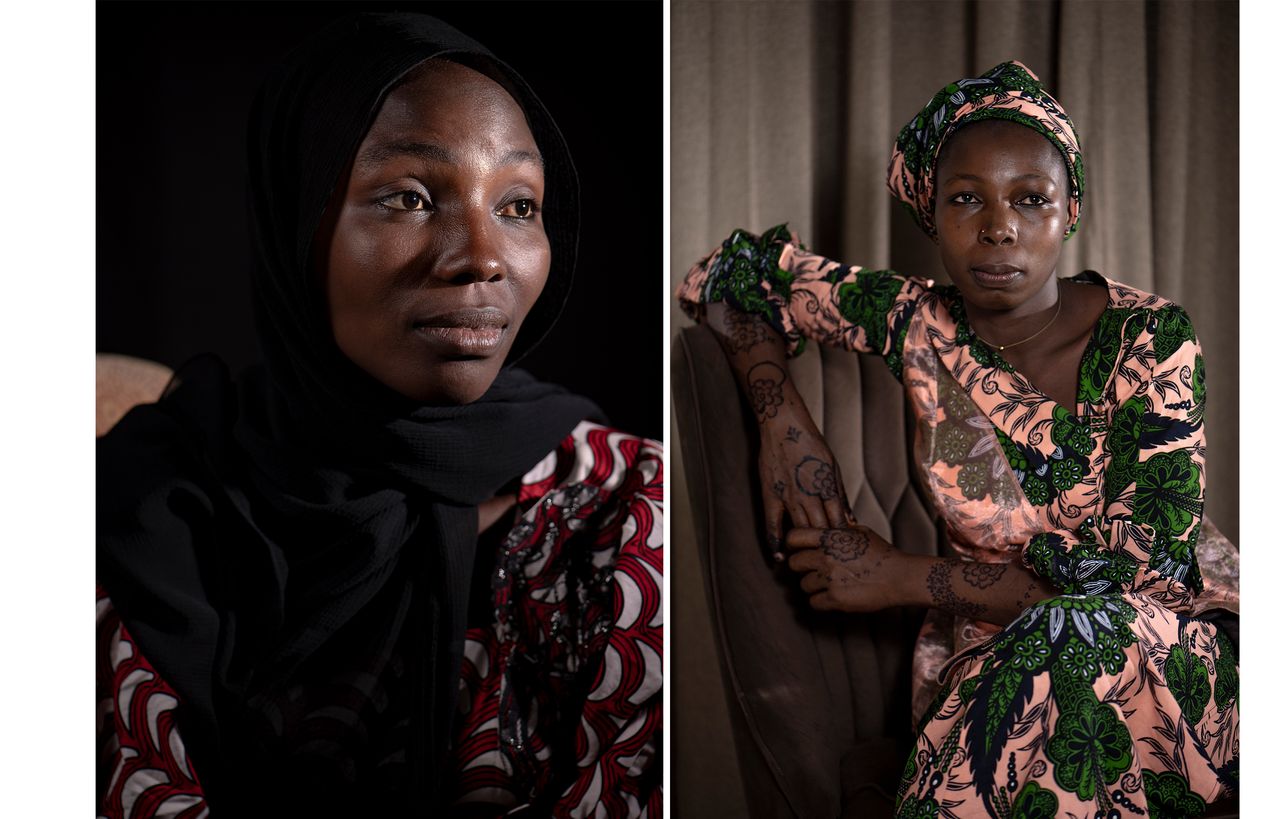Maryam Ali Maiyanga stepped onto the balcony of her university dorm, phone to her cheek, listening for the voice of a sister who had been missing for almost 10 years.
The 26-year-old college student had been lying on her bed, in between math and history coursework, when the screen lit up with her lost sibling’s new phone number. On the campus below, students finishing fall semester were strolling between the manicured flower beds and parking lots of Nigeria’s elite American University.
On the other end, Halima Ali Maiyanga’s voice quivered over a shaky cell line.
“So you escaped? And left me in the forest?”
“There was no chance to tell you,” Maryam replied.
Born less than a year apart to different mothers, the sisters were so close they’d often shared a single mattress as seniors in their high school dormitory: “Like peas in a pod,” their father would say.
Classmates at Nigeria’s Chibok Government Secondary School for Girls had known Maryam as the soft-spoken bookworm who woke before sunrise to read her economics textbook by flashlight. Halima, by contrast, might be whispering to the boyfriend she phoned in those predawn hours when calls were cheap.
On April 14, 2014—10 years ago on Sunday—the militant group Boko Haram stormed in and kidnapped the sisters and 274 of their classmates, the night before their final exams.

Few signs remain of the original Chibok secondary school building. PHOTO: GLENNA GORDON FOR THE WALL STREET JOURNAL
It was an abduction so inconceivable in its scale that it shocked Nigeria, and then, through Twitter, inspired a worldwide hashtag campaign—#BringBackOurGirls—tweeted by celebrities from Oprah Winfrey to the pope. America sent drones and intelligence officers to look for the girls, although they failed to rescue a single student.
Today, in a sign of how even the most shocking tragedies can become commonplace, mass kidnappings of schoolchildren occur regularly in Nigeria, but barely register: Last month, a criminal gang stole 287 pupils from a school in the northern Nigerian town of Kuriga during an assembly. It was one of a staggering 735 mass abductions since 2019, according to SBM Intelligence, a Lagos-based risk consulting firm.
America, once eager to help, these days takes little note. Africa’s most populous nation is in its 15th year of war with Boko Haram and an Islamic State offshoot, which continue to grab children at gunpoint while the country also battles criminal gangs who raise money ransoming children as young as a few weeks old. Most of its 228 million people are too young to remember when the fighting began. It is one of the world’s forgotten conflicts, eclipsed by Israel’s war in Gaza and Russia’s in Ukraine.
The Chibok students were once, briefly, the world’s most famous hostages—overshadowing even the armed conflict that began in eastern Ukraine the week they vanished.
Today 82 remain missing, with no accounting for who among them is still alive. The parents of Sarah Samuel still hold birthday parties for their now 27-year-old daughter every year. Each month, Yana Galang washes her daughter Rifkatu’s clothes, folding them for when she comes home.
The teenagers came of age together in captivity, most of them Christians who tried to keep hold of their faith by whispering prayers together at night or writing Bible passages in a secret notebook. Those who made it out credited high school friendships for their survival. And yet they have since embarked on radically different lives.
Some have gone back to dust-swept villages where the threat of another militant attack looms. Others are a world away. One completed a nursing degree in Pennsylvania. Another is an accountant in Nigeria’s largest city, Lagos.
Grace Dauda, after breaking her leg in captivity, managed to go free, then moved to Harlem, returning to Nigeria to request a student visa, only for the U.S. Embassy to reject it. Naomi Adamu left university for a quiet life outside Chibok, where she and her husband are expecting their second child. Some friendships have survived their freedom, others falling away.
“We do get to reconnect, sometimes,” Adamu said. “We talk about what happened to us. For me, I can never forget until I die.”

Sarah Samuel’s mother still has all of her belongings, including this dress. PHOTO: GLENNA GORDON FOR THE WALL STREET JOURNAL
As children, Maryam and Halima were inseparable, pretending to bake cakes together while helping their father pat smooth and flatten homemade bricks. Their days started with farmwork before sunrise, singing local pop songs in the Hausa language together as they tended peanut and beans in the sandy soil of their father’s garden. They were Muslims growing up on the outskirts of one of the few mostly Christian towns, in a northeast Nigerian region where just 4% of girls finished high school.
Maryam and Halima’s school, the last in the area still open, buzzed with rumors about a strange fundamentalist sect named Boko Haram—meaning Western education is forbidden—whose fighters had been rampaging through villages and torching schools they blamed for polluting the mind of pious Muslims. Parents debated closing the school but reasoned: Just a few more tests and they can graduate.
April 14, 2014, was a Monday, and the students had spent the afternoon finishing a three-hour civics exam. Near midnight, girls awoke to what they thought were soldiers. Peering over bunk beds, dorm mates turned to each other, debating whether to run as the gunfire grew closer, followed by the clamor of men shouting for them to come outside.
As the teenagers stepped into a moonlit courtyard they could see the gunmen were militants dressed in secondhand clothes and looted army fatigues. They had come to steal a brickmaking machine, but after finding hundreds of girls, they loaded them into trucks then torched the schoolhouse. A drive through the night deposited them into what would be first in a yearslong succession of remote hide-outs.
The students were told their parents were dead and Boko Haram’s black flag was flying over Chibok. By day, they attended sermons from the sect’s self-appointed scholars and public judgments, including beatings, amputations and the stoning of a woman accused of adultery. Some of the Christian students were forced to cook and clean for their Muslim schoolmates.
The Muslim students were among the first coerced into marrying commanders. Halima’s new husband already had three wives. Maryam’s slept next to a gun that she was terrified would kill them both.
Around them, the camps and villages of Boko Haram’s self-declared Caliphate were filling up with lost children. By 2016, Boko Haram had kidnapped 10,000 boys—as conscripts—and a similar number of girls. Chibok, still Boko Haram’s best-known kidnapping, was no longer its largest: The group had snatched more than 300 school-age children, most of them boys, from the town of Damasak. That abduction merited almost no news coverage, and just a 40-word Wikipedia entry, ending: “Years later the victims were still unaccounted for.”
Now two years into captivity, Maryam and Halima still didn’t know how much global attention their kidnapping had attracted. Then one afternoon Maryam rifled through her husband’s phone and found a video of thousands of people marching in cities around the world, chanting “Bring back our girls!” After watching it repeatedly, Maryam said a prayer. “I realized that the world really cared about us,” she said.
Soon after, Halima heard the voice of her father, a tough disciplinarian, cracking with emotion in a local radio news broadcast: “I miss my hardworking girls,” he said. She rushed to tell Maryam he was alive. They joked their dad would have probably preferred his boys to be kidnapped: “He always said we were more obedient than our brothers,” Maryam said.
Many of the women around them died in childbirth. After 18 hours of labor, gripping the hand of another abducted classmate from Chibok, Maryam felt lucky to have survived. She resolved to get her newborn, Ali, to safety.
Maryam had wanted to tell her sister she intended to run, to bring her along, even, but she was afraid she could be beaten, or worse, by her captors. Their last glimpse of each other was a fleeting encounter: Halima rode by in the back of a pickup truck full of fighters, returning from a gunbattle. Maryam had widened her eyes, wanting to communicate through the slit of her veil what she couldn’t say, but the teenagers could only exchange a momentary glance before the truck sped away.
On Nov. 5, 2016, after five days of walking with her 10-month-old tied to her back, Maryam reached a small Nigerian military outpost, shouting back over cracks of gunfire to soldiers demanding “who’s there?”
“One of the Chibok girls.”
The soldiers walked her to a military helicopter, one of them pausing to hand her a bottle of Coca-Cola .
Left behind
Around 6:30 a.m. the next day, Halima was holding a battery-powered radio when a broadcast announced that a Chibok girl had escaped. “Tell us your name,” a news reporter asked. A familiar voice answered: “Maryam Ali.”
Halima dropped the radio. She felt disbelief, shock, confusion then disappointment: “There was a bond between us,” she said. “I felt, how could my sister escape without telling me? How come?”
Thoughts swirled through Halima’s mind and she regretted staying put. One night, she had come so close to a government-held town she could see its solar-paneled streetlights. Had she missed her chance to escape?
In her open-air prison, food was already starting to run low—and it was just the beginning. Boko Haram was descending into a bloody internecine war with breakaway fighters loyal to Islamic State.
As the sects battled, Halima was forced to move again and again over months that became years, in search of security and food. An airstrike killed the first militant she’d been forced to marry. The second, himself once kidnapped, fed her from a secret stash of rice, millet and peanuts, buried from other gunmen fighting for food. In 2020, nearly a third of her young life by then spent in captivity, she gave birth to his son, Mohammad.
A new life
Just 165 miles away, Maryam now felt herself a changed woman.
The start of life outside the forest had been a struggle for her and the other former hostages enrolled together in the American University’s remedial program. Students accustomed to perpetual thirst during captivity filled empty bottles with water from the toilets, jealously storing a backup supply.
Insomnia and nightmares lent the dorms a nervous energy. The harmless rumble of a passing jetliner would send students dashing under beds and desks out of fear of an airstrike. They spoke as a group, and when a professor would ask one student how she was doing, the reply was often, “We are fine.”
Bearing the child of a militant meant Maryam would have to excel to overcome the judgments of her community. Some of her classmates refused to even speak to her. The sister she wanted to talk to about it wasn’t there. She tried to convince herself Halima was alive, and at night, she dreamed of her.
Each morning at 5 a.m., she woke for a group exercise class before breakfast and a full schedule. The Chibok students, now young women, had grade-school-level schoolwork to relearn, surrounded by college freshmen their age from posh families in Nigeria’s richest neighborhoods. Maryam failed math three times before clearing the hurdle, preferring literature and social sciences. Her confidence in English grew. One day, the school had a competition to read 1½ pages in English in three minutes. The crowd cheered when Maryam won, walking away with a book as her reward.
“I realized I was really improving,” she said.
She passed the West African equivalent of America’s GED test and enrolled in college courses. She had to retake computing, the second time with the help of a tutor who taught her PowerPoint. In between classes, she called her parents to speak with her son Ali, checking in on his studies at the school where she’d enrolled him.
Sometimes, on TikTok, she would stumble into videos of other Nigerian children being kidnapped; in December 2020, more than 300 young boys were seized from a high school in the town of Kankara, this time not by Islamists, but by bandits seeking a ransom.
The next month, her father called, confused: He had heard a rumor Halima was free. Could Maryam check English-language media? But there was nothing to find.
Halima had come so close to breaking free that she’d managed to call her high school boyfriend—his was the one number she’d memorized. But the escape was chaotic, the roads were confusing, and she’d ended up back in militant territory, stuck. Months went by before she worked up the courage to escape again.
Reunited
The second time, Halima knew the routes. Years of infighting between Boko Haram and its Islamic State rivals had left their ranks disorganized, with few checkpoints or militants remaining along the road. Boko Haram’s leader Abubakar Shekau , the mastermind of the sect’s child kidnapping strategy, had died in May 2021, detonating a suicide vest around him as his rivals closed in .
Halima was weak from hunger, fighting a persistent fever, and struggling to carry her son. But a way out was now open.
One evening, she put her son on her back and slipped out, sneaking through cornfields, then losing her bearings as the sun set, before finding her path again. It was fully dark when she approached two soldiers near a military tent, begging: “Please help me.”
The soldiers whisked Halima to a military barracks then a hospital. For three weeks, nurses treated her for typhoid, malaria, a gastric ulcer, and an eye infection that left tears rolling down her face. Her blood pressure was abnormally high.
Maryam, in university, had settled into the parallel existence of learning more shortcuts in the Microsoft Office suite and mastering the grammar of Fulfulde, a West African language. She was unaware her sister had finally escaped. Rumors dripped out for months before a documentary filmmaker assured her it was true. Months more crawled by before Maryam could find a number to reach her. Their father, protective of Halima and in regular contact with her, debated whether the two should reconnect. Finally, lying on her dormitory bed, one afternoon, she looked up to see a text message from her brother with Halima’s number.
She stepped out onto the balcony as she dialed.
“Hello?”
“Can you recognize my voice?” Maryam answered.
When the sisters first met in person, neither could speak for 30 minutes.
“I said, ‘Maryam, we should stop crying,’ ” Halima said. “We should thank God that we are all free and alive.”

Halima is learning sewing and other skills at a rehabilitation center in Maiduguri. PHOTO: ETINOSA YVONNE FOR THE WALL STREET JOURNAL
Today, Halima boards a bus daily from government housing in the regional capital, Maiduguri, to a rehabilitation center. She takes entry-level English in the morning followed by tailoring and typing classes in the afternoon. She wants to join her sister at the American University and wants them to be closer again, bridging the gaps of trauma and eight years of separation.
Often, the two miss each other’s calls. The lives of the once-inseparable sisters have diverged in ways they could never have imagined.
“I should call her more often,” Halima said. “We now have different lives.”
To Maryam, it is one more scar of a kidnapping that upended their community and changed their country a decade ago. “Ten years is a long time,” she said. “We’re trying to get to know each other again.”
Write to Joe Parkinson at joe.parkinson@wsj.com and Drew Hinshaw at drew.hinshaw@wsj.com



